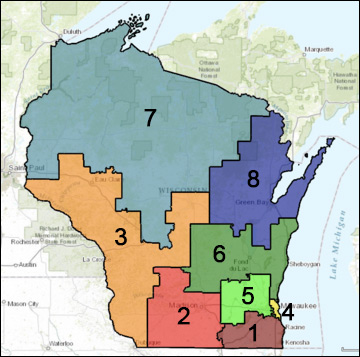By Jim Ellis

Wisconsin Congressional Districts
Dating back in this COVID-19-spurred election scheduling controversy, Democrats quickly began urging Gov. Tony Evers (D) to initiate action with the legislature to postpone the presidential and statewide primary as a part of the virus precautions.
Gov. Evers failed to act swiftly and did not go to the legislature until late last week when the majority Republican leadership turned down his request to postpone the April 7 vote. Democratic Party leaders then went to court in an attempt to extend the absentee ballot deadline and were successful until the Republicans asked the US Supreme Court to step in and negate the timeline ruling.
The lower court directive that included the prohibition on reporting vote totals was consistent with the ruling to extend the absentee ballot return deadline, otherwise vote totals would be made public before a large number of individuals had cast their ballots.
In the meantime, Gov. Evers declared a state of emergency and attempted to unilaterally move the election to June 9. Republicans argued that a governor has no such power even under an emergency order and petitioned to the Wisconsin State Supreme Court to strike down the Evers move.
On Monday, both the US and Wisconsin Supreme Courts ruled that the election would continue under its present schedule with original deadlines. Interestingly, however, the SCOTUS did not reverse the entire lower court ruling, and the section about directing county clerks not to report the election returns until April 13 remained intact. Thus, a quirk in the high court decision is now causing an unnecessary delay in seeing the outcome of the presidential primary and the state Supreme Court judicial election, that latter of which is actually the centerpiece of this election and at the heart of the scheduling controversy.




 April 2, 2020 — With the COVID-19 virus playing havoc with virtually every aspect of American life, including elections, how are the House vacant seats being affected?
April 2, 2020 — With the COVID-19 virus playing havoc with virtually every aspect of American life, including elections, how are the House vacant seats being affected? The early media time reservations are invested in five states: Arizona, Colorado, Iowa, Maine, and North Carolina. This is certainly not the limit of the SMP planned expenditures, nor is the organization likely committed to fulfilling the entirety of this time buy without having negotiated an escape clause. All depends upon their agreements with the individual television outlets and does not include any future expenditure the group may make for radio and digital advertising.
The early media time reservations are invested in five states: Arizona, Colorado, Iowa, Maine, and North Carolina. This is certainly not the limit of the SMP planned expenditures, nor is the organization likely committed to fulfilling the entirety of this time buy without having negotiated an escape clause. All depends upon their agreements with the individual television outlets and does not include any future expenditure the group may make for radio and digital advertising.